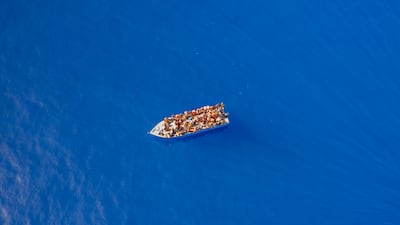Germany’s human rights commissioner has accused Libya of repeated failings in Mediterranean search and rescue operations, calling it an unreliable partner.
Luise Amtsberg said people returned to Libya risk being exposed to abuses and that Germany’s co-operation with the country's coastguard was untenable. She urged the EU to follow Germany's lead in ending support for the agency.
The Mediterranean Sea, which lies between North Africa and southern Europe, is a major route for asylum seekers and other migrants fleeing their homelands.
“The actions of the Libyan coastguard have shown time and again that Libya is not conforming with human rights standards in the fulfilment of this mandate,” she said.
“International law and human rights are being repeatedly violated at sea and on land. The Libyan coastguard is therefore not a reliable partner for the European Union.”
Libya and Tunisia are key starting points for asylum seekers headed for EU member states Italy and Greece. Others sail from farther east and head for Balkan nations.
Human traffickers have benefited from the chaos in Libya, where a civil war and political upheaval have caused problems for several years.
People smugglers bring migrants across the country’s lengthy borders with six nations and they are then packed into ill-equipped, flimsy boats and set off on risky sea voyages.
Lampedusa, an island closer to North Africa than mainland Italy, is one site where people smugglers charge desperate migrants hundreds of dollars to cross the Mediterranean Sea on packed, overcrowded dinghies.
Migrant arrivals have risen sharply compared to the previous year, with 30,000 people making the crossing so far compared to 22,700 in the same period in 2021, and 7,500 in 2020.
In recent years, the EU has worked with Libyan authorities to prevent the crossings, but the partnership has been criticised by rights groups.
Under Operation Irini, the EU ensures implementation of the UN arms embargo on Libya, helps train the Libyan coastguard and disrupts human trafficking.
“From a human rights perspective, co-operation with the Libyan coastguard is therefore untenable,” she said.
“This is one reason why the German government has already modified Germany’s involvement in Operation Irini to remove support for the Libyan coastguard from the mandate.”


